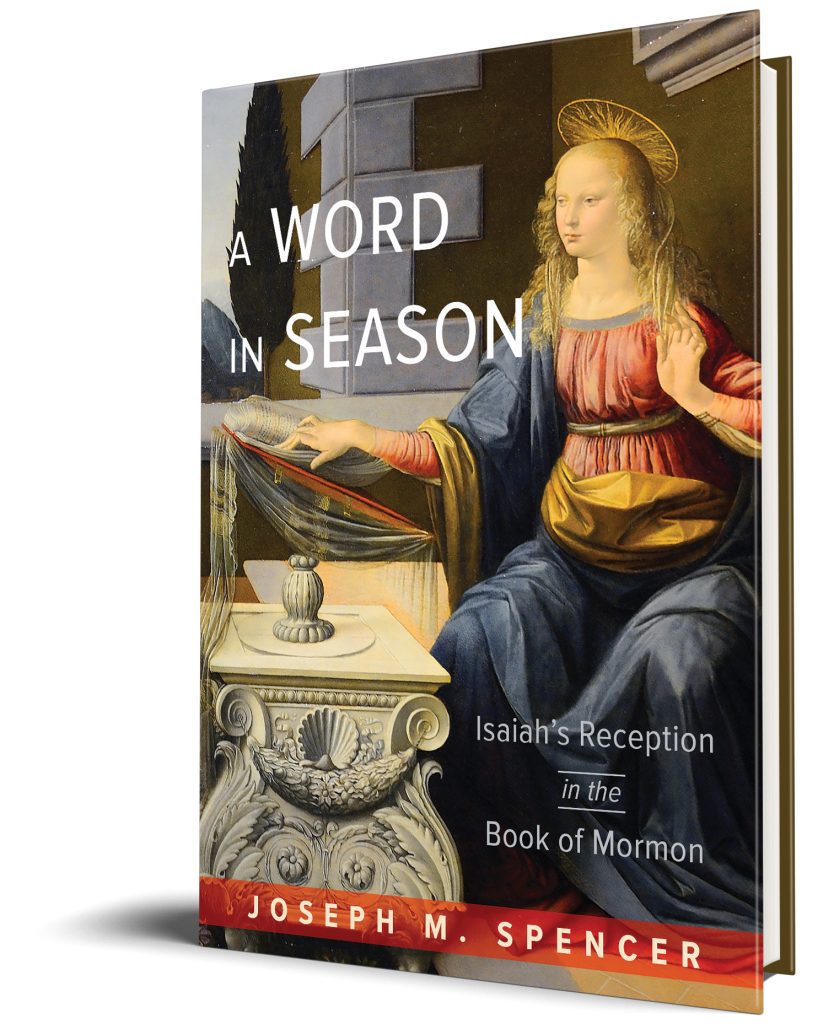Joseph M. Spencer, author of A Word in Season: Isaiah’s Reception in the Book of Mormon, answers questions on his new book.
Q: Why did you decide to write this book?
For all the scholarly attention it has received in recent years, the Book of Mormon remains an underexplored text. Various questions have been put to the book, but no one seems to have been asking whether it has a unified project—a grand, overarching message that it’s offering to the world (apart, of course, from encouraging readers to believe in it). I’ve been striving for years, therefore, to discern the literary and theological unity of the Book of Mormon. From the outset, I wondered whether the key to this might be the volume’s interactions with the biblical figure of Isaiah, whose writings are scattered (but in no way haphazardly) across the book. Believers in the volume’s divinity universally recognize that Isaiah is important to the Book of Mormon, since the resurrected Jesus Christ strongly endorses him at the volume’s narrative climax. Yet they tend to balk at the prophet’s obscurity and so to express anxiety at the apparent centrality of something so challenging in a book they otherwise regard as plain. I wanted, in working on A Word in Season, to see if I couldn’t sort out what Isaiah’s doing in the Book of Mormon, and in a way that reveals the real unity of the whole book.
Q: What is the most interesting discovery you made while researching and writing your book?
A long way into research A Word in Season, I began to see how the order in which one reads the contents of the Book of Mormon might be essential to understanding the role Isaiah plays in the volume. There is, of course, the order of the volume’s contents known from printed editions of the book, but Joseph Smith, the man who dictated the English text of the Book of Mormon to scribes in 1829, did so according to a different order. When the Book of Mormon is examined in the order of its original dictation, the volume’s various interactions with Isaiah suddenly take on a fascinating shape—one that makes the interpretation of Isaian prophecy the cumulative concern of the whole book. Such an approach further allows the careful reader to separate out two distinct Isaian projects within the Book of Mormon that nonetheless dovetail in interesting and striking ways. I suspect that, in the long run, the disorientation of reading the Book of Mormon in dictation order will help to reveal the ways its larger shape—even in final form—really works.
Q: What myths do you hope your book will dispel or what do you hope your book will help readers unlearn?
Both believers in and critics of the Book of Mormon have largely had the same basic understanding of the role that the book of Isaiah plays in the volume. Both sorts of readers, that is, have largely taken Isaiah’s presence in the Book of Mormon to be a haphazard affair: at best a secondary witness to the volume’s intentions, somewhat artlessly forced into the volume; at worst a confused collection of filler materials loosely connected to the volume’s themes. In many ways, progress on sorting out Isaiah’s place in the Book of Mormon has been prevented by an obsession with deciding on what the very presence of Isaian texts in the volume might mean about believers’ claims about the antiquity of the book. I hope that the work I’ve done in A Word in Season will dispel such longstanding understandings of the Book of Mormon entirely. Whatever else the Book of Mormon is, it can be shown to involve an extended and strikingly thoughtful engagement with the meaning and relevance of the writings attributed to Isaiah. With arguments about the antiquity of the Book of Mormon put temporarily out of play, the coherence of the volume’s Isaian project comes into real clarity.
Q: Which part of the publishing process did you find the most interesting?
Self-serving as it may sound, it was marvelously gratifying to reread the whole of A Word in Season in finished form—that is, after the book had been fully typeset and needed to be read for proofing. The work of writing a book is divided into so many thousands of individual labors, all the way up until the proofs are in one’s hands. Even after the manuscript is initially complete, there are the changes that need making in response to reviewers’ comments, tweaks that seem wise in light of further reading before sending the manuscript into production, phrasing and word choice that call for renewed attention after copy edits come back. But once all of that was done, and I had the opportunity to read the entire book as a reader myself, seeing the thing as a whole after enough time had passed to feel like I had some distance, I felt like I could see what I had accomplished. That moment was a long time coming, and it was odd in many ways, but it was also incredibly interesting to see my own work from outside, so to speak.
Q: What is your advice to scholars/authors who want to take on a similar project?
Because A Word in Season tries to accomplish two different things in one project—on the one hand making better sense of the Book of Mormon, and on the other looking at Isaiah’s reception history—I suppose I have two distinct sorts of advice. To those hoping to write academically about the Book of Mormon, I would recommend asking and honestly answering the hard question of whether any particular argument about the book’s meaning approaches explaining the whole of the book’s meaning. Far too much that has been written about the book has drawn conclusions that immodestly outstrips the limited portions of the book being analyzed. To those hoping to write about Isaiah’s reception history, I would recommend adding to the conversation by pursuing deep and probing research into one relatively limited example of reception, rather than trying to sketch broad patterns in reception history. The larger outlines of Isaiah’s reception—or the reception of any part of the Bible—stand to become clearer only when serious attention is paid to the minute details.
Q: What do you like to read/watch/or listen to for fun?
When I’m not working on my academic projects, I’m usually either listening to and reading about music, or watching and reading about film. A few books in popular music history (Joshua Clover’s 1989 and Chuck Klosterman’s reflections throughout his oeuvre) have triggered in me an abiding interest in broadening my listening habits, and in reading interesting music criticism. I’ve become especially enamored of the 33 1/3 volumes published by Bloomsbury. And, of course, I read all I can about the Beatles. As for film, I’ve given years to reading whatever I can find about Alfred Hitchcock—and especially about his marvelous film Vertigo. Lately, however, I’ve developed a taste for film noir as a genre, and I’ve been reading a string of books on the genre’s meaning and development. I keep wondering when I’ll talk myself into writing a book about intellectual intersections among Hitchcock, They Might Be Giants, and the Book of Mormon!

Joseph M. Spencer is an associate professor of ancient scripture at Brigham Young University.

